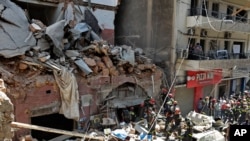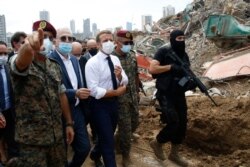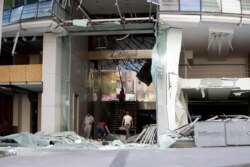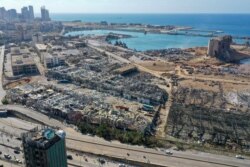Rescuers continued to search Thursday for the missing following Tuesday’s massive blast at Beirut’s port, while visiting French President Emmanuel Macron warned the country would continue to weaken without serious reforms.
The Health Ministry said the number of dead has risen to 137, along with more than 5,000 people injured in the explosion. Officials expect the death toll will rise.
Macron in Beirut
Macron visited Beirut Thursday to meet with political leaders. France, the former colonial power in Lebanon, is sending emergency doctors and several tons of medical equipment.
Macron’s visit came amid mounting anger against Lebanon’s various political groups that have ruled the country since the end of the 15-year civil war in 1990. Long-serving politicians are widely viewed as corrupt and incapable of providing even the most basic services such as electricity.
As Macron toured one of the hardest-hit neighborhoods, a crowd of angry people chanted “revolution” and “The people want to bring down the regime.”
Macron, the first foreign leader to visit Lebanon since the explosion, said a global conference would be held within the next few days to raise money for essential goods and services such as food, housing and medical assistance.
The French leader warned the crowd “if reforms are not made, Lebanon will continue to sink.” But he said the tragedy should usher in a “new era” in the country and vowed that aid to rebuild Beirut “will not go to corrupt hands.”
State of Emergency
Lebanon’s Cabinet has declared a two-week state of emergency and ordered the military to place under house arrest anyone who was involved in warehousing explosive material that detonated at the port.
Authorities are investigating what led to the blast, and leaders have put the focus on what they said was tons of ammonium nitrate that had been stored at port warehouses for the past six years.
President Michel Aoun has pledged those accountable would face “the most severe penalties.”
A Lebanese official who is a target in the probe has tried to shift blame for the explosives at the port. Badri Daher, head of the Customs Department, told LBC television late Wednesday that officials sent as many as six letters to the judiciary over the years asking that the ammonium nitrate be removed because of the dangers it presented.
Daher said he could do nothing more than alert authorities, even if it meant “extra work” for him and his predecessor. Daher also maintained the port authority was responsible for the explosive material, while his responsibility was to prevent smuggling and collect duties.
Anger reaching boiling point
Human Rights Watch meanwhile has called for an independent investigation of the explosion. In a statement released Wednesday, the global non-governmental group said the Lebanese government should invite international experts to conduct a probe to “determine the causes and responsibility for the explosion and recommend measures to ensure it cannot happen again.”
The Christian aid organization, World Vision, said Thursday the explosion “severely impacts” its efforts to provide aid to the Lebanese during the coronavirus pandemic and the country’s economic crisis. Spokesman Hans Bederski told The Associated Press that the shuttering of the port would make it “extremely challenging” to replenish non-perishable goods once they are exhausted.
The explosion devastated the vital port area and was so strong it blew out windows far from the port and damaged numerous buildings.
Beirut Gov. Marwan Abboud said Wednesday the “apocalyptic situation” has left an estimated 300,000 people homeless.
In the aftermath, hospitals were overrun with people seeking care. Survivors with their faces and clothes covered in blood were walking through the streets.
The World Health Organization said Wednesday three hospitals in Beirut were heavily damaged in the blast and are not currently functional. WHO said two other hospitals are only partly operational.
International response
The international community has responded with condolences for the dead and offers to help the people of Beirut with recovery efforts.
Russia sent a military hospital along with 50 medical workers, while Qatar is dispatching field hospitals and medical aid. Iraq is sending its own crew of medical workers along with truckloads of medical supplies.
Tunisia offered to bring patients back to its hospitals for treatment.
Australia said Thursday it would contribute an initial round of $1.4 million in aid for Beirut, while Britain pledged a $6.6 million aid package, and Hungary said it would donate $1.2 million to help with rescue and reconstruction efforts.
Germany sent about 50 search and rescue specialists along with search dogs from its civil protection organization to help locate people who may be stuck in the rubble.
U.S. response
President Donald Trump said Wednesday he’s “heard it both ways” — that it could have been an accident or “a bomb.”
The U.S. State Department said Wednesday that Secretary of State Mike Pompeo spoke with Prime Minister Hassan Diab Wednesday to reaffirm Washington’s “steadfast commitment to assist the Lebanese people.”
Presumptive Democratic presidential nominee Joe Biden expressed sympathy for the victims of the explosion and urged the Trump administration and the international community “to immediately mobilize assistance to the thousands injured in the blast.”
VOA's Nike Ching from the State Department and Jeff Seldin, VOA's National Security Correspondent, contributed to this story.

















